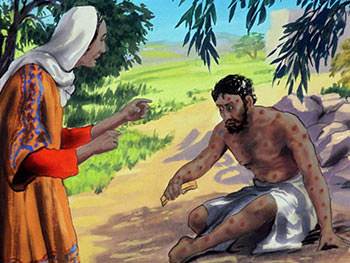A sermon at Crooked Creek Baptist Church by Rev. Joy Amick got me thinking about the story of Job’s wife in different ways than I had before. Job’s wife has an extremely brief role in the story, and typically we have understood her in an entirely negative way. This is partly due to assumptions we make about her and about Job, partly due to things we neglect to consider, and partly due to how a crucial word in the story is translated.
 The thing we rarely if ever think about is the fact that everything Job lost, his wife lost as well, including children that she herself gave birth to. We don’t know what she said immediately after this, but when Job himself begins to be afflicted, then we are told. Before we consider what she said, let’s consider how she would have naturally viewed what had happened. First, disaster had befallen her household. She would have wondered why. Then, not long after, Job himself was afflicted with sores. She would naturally have understood this to be divine punishment for wrongdoing. The conclusion to draw would have been obvious: the death of her children had been Job’s fault.
The thing we rarely if ever think about is the fact that everything Job lost, his wife lost as well, including children that she herself gave birth to. We don’t know what she said immediately after this, but when Job himself begins to be afflicted, then we are told. Before we consider what she said, let’s consider how she would have naturally viewed what had happened. First, disaster had befallen her household. She would have wondered why. Then, not long after, Job himself was afflicted with sores. She would naturally have understood this to be divine punishment for wrongdoing. The conclusion to draw would have been obvious: the death of her children had been Job’s fault.
She could easily have been bitter and wished Job dead. And yet that isn’t quite what she says, according to the Hebrew text. The English translations consistently say that she told Job to curse God and die. The Hebrew says that she told him to bless God and die.
I wonder whether the meaning of her question and advice to Job was not to ask whether he is still pretending to have integrity, and advising him to reconcile to God before he dies. Whether the thinking was that he should bless God and admit his wrongdoing in the hope that God would put him out of his misery, or that he should bless God before his death that God seemed determined to inflict on him and thus before it was too late, both are options that had never really occurred to me before, unsurprisingly given how her words are usually translated and how her story is usually interpreted.
I’m not sure whether the misogyny is in the story itself, its interpretation, or both. But it is at least possible to read the story in ways that make her seem, at worst, akin to Job’s friends in assuming that he has done something to incite God’s anger. Even then, however, she had lost her own children because of what Job had supposedly done, and so any blame she lay at his feet has a profoundly different character to it than that of Job’s friends. No one should fail to feel sympathy for a mother grieving the simultaneous untimely death of her children, if she looks to blame someone for it. Even so, she doesn’t seem to simply wish ill on Job in the way we usually assume.
I don’t think this will end up in the book I’m currently writing. I will at least mention that, among the women from whom Jesus learned are the women whose stories are told in the Jewish scriptures. But at this point I’m not sure I see concrete evidence that Jesus thought about the story of Job and his wife, and if so how it influenced him.
But apart from that, I can still offer a blog post and offer a defense of Job’s wife, yet another unnamed and unfairly-maligned woman from the Bible.













